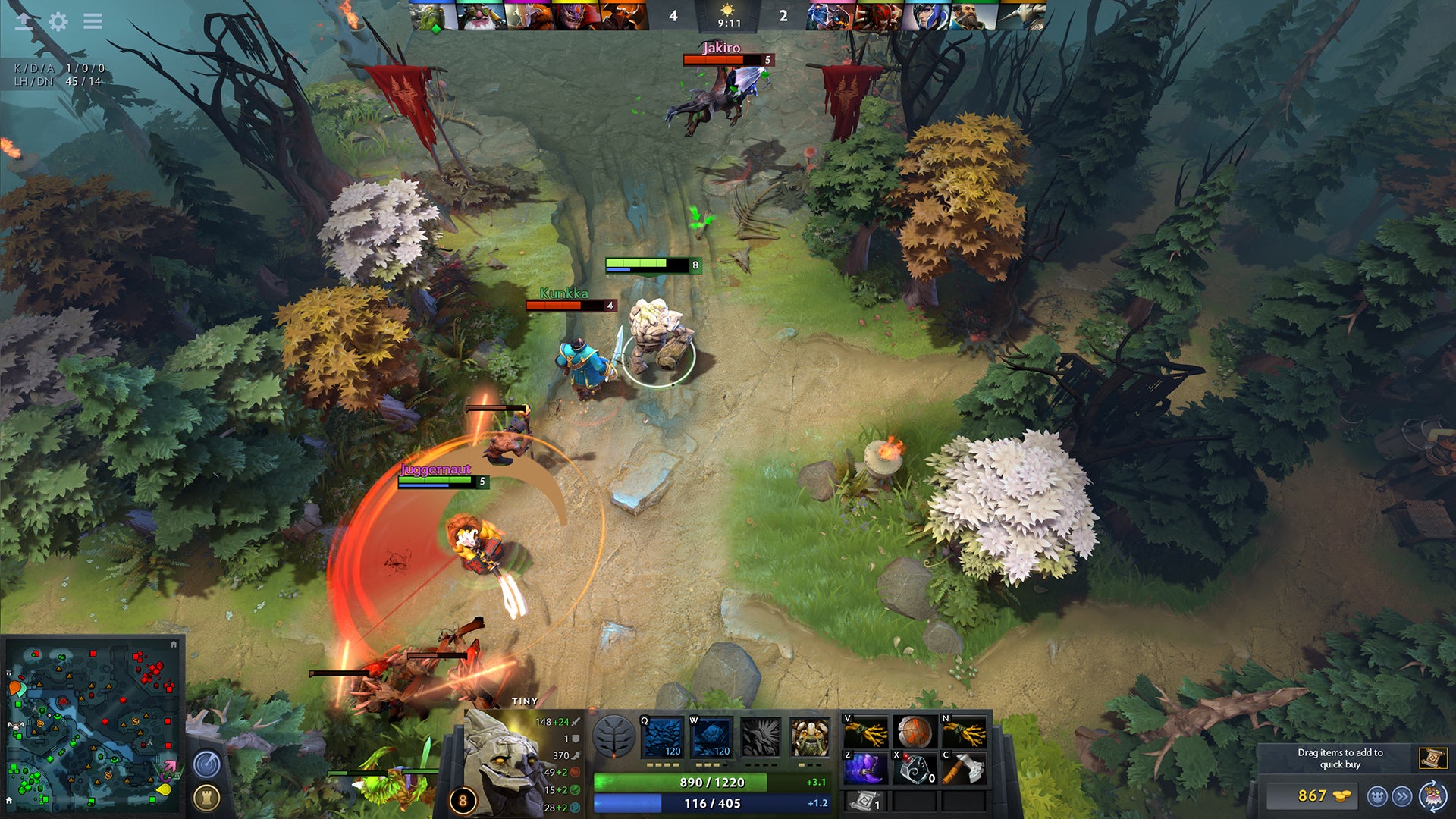With their high performing Full Fibre Broadband crafted exclusively for gamers, alongside the EE Game Store housing the latest tech and best-selling titles, it’s easy to see how EE have become major players in the world of gaming.
They’re also the official telecoms partner of competitive esports team, GIANTX, who know firsthand that it takes more than just a high-speed broadband connection to reach the big leagues.
For all the aspiring pros out there, we asked GIANTX members Jackies and Purp0 which esports titles are the hardest to master, and why…
Dota 2
The first game our esports pros locked on to was Valve’s multiplayer online battle arena, Dota 2, a five-a-side sequel to Defense of the Ancients (DotA). In essence, each team must defend their designated base, controlling a “hero” character with unique skills and varied playstyles, with the aim to destroy the “Ancient” structure within the enemy team’s base. Sounds simple right? Hold that thought…
What makes Dota 2 so challenging is the sheer amount of information and variables being thrown at the player; there are 100+ characters and items, tons of complex mechanics, differing abilities, varied units etc. New players can be quickly overwhelmed, and seeing as they’re often up against players with 1000s of hours of experience, it’s easy to understand why this MOBA can feel almost impenetrable to newcomers.
League of Legends
The aptly named LoL is no joke when it comes to professional difficulty. Riot Games’ multiplayer online battle arena game has many similarities to Dota 2; two teams of five scrap it out in PvP combat, each defending their half of the map, and controlling a “champion” character with individual playstyles and differing abilities.
The complexity of gameplay variables seen in Dota 2 is also at play here, and players are often divided on which is the tougher of the two MOBAs. While Dota 2 requires unprecedented game knowledge, League requires more mechanical skill. GIANTX’s Jackies cited that League is a game where you must be “ready for any situation”, while his teammate Purp0 concluded that the margin for error is very slim during matches, expressing that the only way to improve is to analyze each match and “learn your mistakes to win”.
CS2
The fifth entry in the franchise, Counter Strike 2 is a free to play tactical first person shooter with an extremely high “skill ceiling” – that is to say that the best players will have honed their skills to a degree that feels logistically unattainable for new players. To even be considered an average player involves perfecting the core shooting mechanics, such as precision aiming and maintaining accuracy while moving.
GIANTX’s Purp0 explains that it’s all about “fast reacting” to a series of “micro situations”, while Jackies reiterated players must “always be on your toes.” The level of pressure in each match is extremely high, so even if players can put in the practice and develop the skills necessary to reach the insanely high standards of the pros, they’ll still need to be able to cope with the mental strain of competitive play during leagues and tournaments.
Valorant
Free-to-play tactical hero shooter Valorant was flagged by GIANTX’s Jackies and Purp0 as a very unforgiving esports title, particularly for newcomers. As with fellow shooter Counter Strike 2 (Valorant takes inspiration directly from the Counter Strike series), the biggest key to mastering the game is having insanely fast reactions, and being able to adapt quickly in high octane situations.
One problem that sadly affects Valorant (and many of the other titles on this list) is a phenomenon known as “smurfing”, where veteran players purposely create a fresh account just to dominate less skilled players. Jackies explained that “smurfing” can raise the barriers of entry and “be challenging for new players since they get punished by playing against players that are in the game for a long time.” It’s tricky for developers and publishers such as Riot Games to mitigate this, and it’s certainly a widespread issue within competitive online gaming.
Rocket League
Our final entry, vehicle-based sports title Rocket League is a classic example of a game that’s easy to play, but incredibly tough to master. Sure, many casual players will fire it up on a night in with friends, but to take the experience pro is a whole other…ahem, ball game.
Firstly, unlike many other sports games, there are no assisting mechanics to help you land a goal – the game runs on pure physics, so precise movements and unbridled mechanical control are needed during high pressure situations. As Jackies says, “you cannot slip up mechanically or you get instantly punished.” From airdribbles to 45 degree flicks, the game also doesn’t directly teach players the core mechanics they’ll need to excel, which has led to a boom in tutorial content on YouTube from the game’s dedicated community.
Fancy yourself as a pro gamer? If you’re looking to get into any of the titles above, you’ll need fast reactions, and even faster broadband – thankfully that’s where EE Full Fibre broadband comes into play.
Learn more about esports team GIANTX here, and if you’re looking at picking up the latest games, consoles or accessories head over to the EE Game Store, open to every player on any network.





